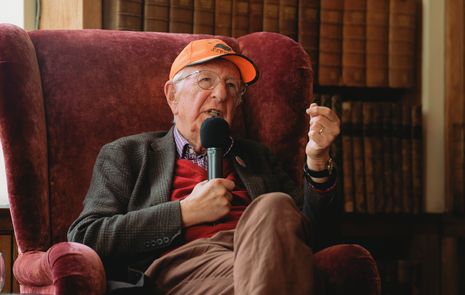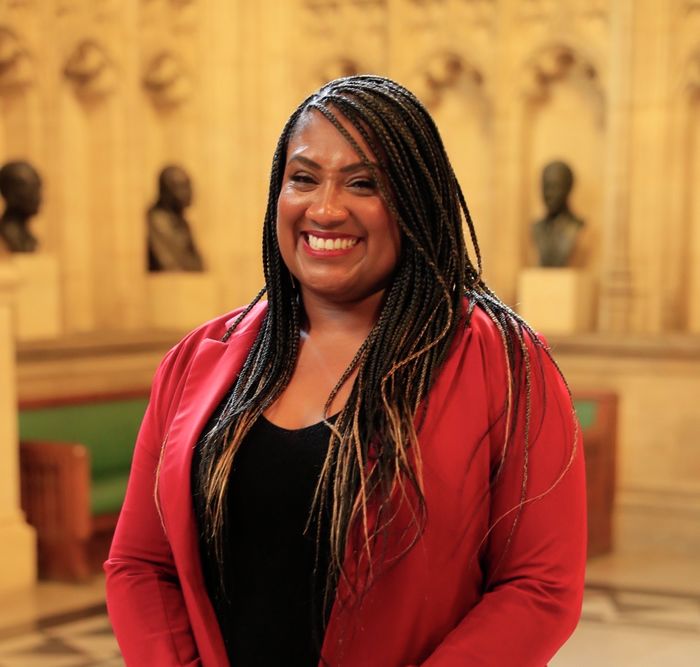Baron Layard: an argument for happiness
Claire Ding and Vienna Kwan sit down with Baron Layard to discuss co-founding the World Happiness Report, Cambridge in the 50s, and what makes him happy

Across social media, you’ll often see posts citing the World Happiness Report – headlines like “Finland ranked the happiest country in the world” or “Why does country X have such a low happiness index?” What many don’t realise is that the man behind this report is a Cambridge alumnus.
Sitting across from us in the Union’s Members’ Room is Baron Richard Layard. Matriculating in 1954 at King’s College, Layard joined Cambridge to read history after being in the army. Wearing a bright orange hat and a circular pin on his jacket reading ‘Action for Happiness’, he returns to Cambridge for a talk at the Union.
Happiness has long been a central concern. Yet, few may be familiar with the field of happiness economics, an area that Layard has helped pioneer since the 1970s. Entering the field of economics in his 30s, Layard went on to co-develop the influential Layard-Nickell model of unemployment in the 1980s, still widely used by economists and policymakers today across Europe.
“We had to know: was Layard a happy student at Cambridge in the 50s?“
We had to know: was Layard a happy student at Cambridge in the 50s? Layard says yes, but the only time he “felt slightly depressed” was the beginning. He recalled the difficult transition from the “real life” he had in the army. Despite the initial stress, he spoke warmly of his experience here. Revealing the competitive atmosphere that shapes the university today, Layard expressed surprise. In his day, “students weren’t competing with each other and most aspired to public service roles such as teaching, medicine, or the civil service”. An answer that certainly surprised us.
For Layard, he views academia as “a more disciplined way of thinking about policies”. His whole life, he has tended to think about “the big issues” and the “one particular policy” he wants to push. For him, that policy is the policy of happiness.
Layad holds an ethical position grounded in a mix of utilitarianism and Aristotelian virtue ethics. He views the aim of all human activity to be “maximising happiness”, but “you’re not going to be doing a calculus every moment of the day”. Instead, “you’ve got to operate by some rule of thumb” in general. He differentiates between these two modes of thinking, referencing the book Thinking Fast and Slow by Daniel Kahneman.
Layard believes that these principles should guide both private action and public policy. Since the 1970s, he has advocated for policies that maximise social welfare based on how much happiness they can generate across societies.
“Everybody has an interest in the maintenance of peace everywhere”
Crucially, Layard views happiness to have global relevance. Emphasising the need for “international collaboration” for issues such as climate change, he acknowledged its obstacles. However, he underscored the imperative for countries to recognise their common interests. Above all, he highlighted the universal stake we all have in peace: “everybody has an interest in the maintenance of peace everywhere.”
Co-founding the World Happiness Report in 2012, Layard offered a global perspective on life satisfaction. His key takeaway is that public spending should reflect what people truly value. In recent years, Layard has focused on mental health and wellbeing, arguing that these should be regarded as central to happiness on individual, national, and international levels. As a member of the House of Lords, he even helped to introduce mindfulness courses to Parliament.
As our interview came to a close, we asked the man who has spent decades researching happiness the ultimate question: what makes him happy? His answer was surprisingly simple: “my wife, my work, doing something useful, and tennis”.
Happiness can serve as both a national and international policy goal. However, Layard’s answer reveals a deeper truth – happiness in the everyday sense is found in the simple things like the people we love, the work we value, and the simple moments of joy we encounter. Even amidst the intensity of Cambridge exam season, it’s a reminder that happiness may be closer and more attainable than it often seems.
 News / Colleges charge different rents for the same Castle Street accommodation2 March 2026
News / Colleges charge different rents for the same Castle Street accommodation2 March 2026 News / News in Brief: waterworks, wine woes, and workplace wins 1 March 2026
News / News in Brief: waterworks, wine woes, and workplace wins 1 March 2026 News / Climate activists protest for ‘ethical careers policy’1 March 2026
News / Climate activists protest for ‘ethical careers policy’1 March 2026 News / Angela Merkel among Cambridge honorary degree nominees27 February 2026
News / Angela Merkel among Cambridge honorary degree nominees27 February 2026 News / Private school teacher who lied about Cambridge degree barred from teaching27 February 2026
News / Private school teacher who lied about Cambridge degree barred from teaching27 February 2026









